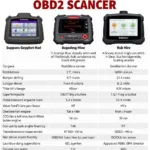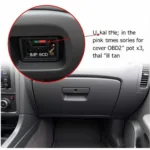OBD2 GPS car trackers have emerged as powerful tools for both individuals and businesses looking to enhance vehicle security, optimize fleet management, and gain valuable insights into driving behavior. By combining the diagnostic capabilities of the OBD2 port with the location tracking of GPS technology, these devices offer a comprehensive solution for a wide range of automotive needs.
Understanding OBD2 GPS Car Trackers
An OBD2 GPS car tracker is a compact device that plugs directly into a vehicle’s OBD2 (On-Board Diagnostics) port, typically located under the dashboard. This port acts as the vehicle’s data hub, providing access to various parameters like speed, engine RPM, and fuel consumption. The tracker utilizes this data to monitor the vehicle’s location and performance in real-time.
How OBD2 GPS Car Trackers Work
OBD2 GPS car trackers are equipped with a GPS receiver to determine the vehicle’s location. This information, along with the data collected from the OBD2 port, is transmitted to a server via cellular networks (GSM/GPRS). Users can then access this data remotely through a dedicated mobile app or web platform.
Benefits of Using an OBD2 GPS Car Tracker
OBD2 GPS car trackers offer a plethora of benefits for both individual car owners and businesses:
- Real-Time Vehicle Tracking: Monitor the exact location of your vehicle anytime, anywhere.
- Anti-Theft Protection: Get instant alerts if your vehicle is moved without authorization, increasing the chances of recovery.
- Geofencing: Set up virtual boundaries and receive notifications when your vehicle enters or exits designated zones.
- Trip History and Reporting: Access detailed logs of past trips, including routes, distances, and driving times, ideal for expense tracking or fleet management.
- Driver Behavior Monitoring: Track driving habits like speeding, harsh braking, and rapid acceleration, promoting safer driving practices.
- Vehicle Diagnostics: Receive alerts about potential engine issues or maintenance reminders, enabling proactive vehicle care.
Choosing the Right OBD2 GPS Car Tracker
With numerous OBD2 GPS car trackers available, selecting the best one depends on your specific needs and budget:
- Tracking Features: Consider the importance of real-time tracking, geofencing, and trip history.
- Diagnostic Capabilities: Determine the level of detail you need regarding your vehicle’s health and performance.
- Cellular Coverage: Ensure the tracker supports reliable cellular networks in your area.
- App and Platform Functionality: Choose a device with a user-friendly app or platform that provides the desired features and reporting options.
- Subscription Costs: Factor in the ongoing subscription fees for data transmission and platform access.
Installation and Setup
One of the key advantages of OBD2 GPS car trackers is their simple installation process. Most trackers can be easily plugged into the vehicle’s OBD2 port without requiring professional help. Once installed, follow the manufacturer’s instructions to set up the device and connect it to your chosen platform or app.
Conclusion
OBD2 GPS car trackers have revolutionized vehicle tracking and diagnostics, providing a comprehensive solution for individuals and businesses alike. By offering real-time location monitoring, valuable insights into driving behavior, and potential cost savings through proactive maintenance, these devices offer peace of mind and enhanced vehicle management. When selecting a tracker, carefully consider your needs, budget, and the features that are most important to you.
FAQs about OBD2 GPS Car Trackers
1. Are OBD2 GPS car trackers compatible with all vehicles?
Most OBD2 GPS trackers are compatible with vehicles manufactured after 1996 that are equipped with a standard OBD2 port. However, it’s always recommended to check the tracker’s specifications and compatibility list before purchasing.
2. What happens if the OBD2 GPS tracker is unplugged?
If the tracker is unplugged, you will lose real-time tracking capabilities. However, most trackers have built-in batteries that will provide temporary power and send you tamper alerts.
3. Do I need a subscription for an OBD2 GPS car tracker?
Yes, most OBD2 GPS trackers require a monthly or annual subscription to cover data transmission costs and access to the tracking platform or app.
4. Is it legal to use an OBD2 GPS car tracker?
Laws regarding GPS tracking vary by jurisdiction. Generally, it is legal to use a GPS tracker on a vehicle you own or have permission to track. However, it is important to be aware of and comply with local laws and regulations.
5. Can an OBD2 GPS car tracker drain my car battery?
OBD2 GPS car trackers draw minimal power from the vehicle’s battery and are designed to prevent battery drain.
6. Do OBD2 GPS trackers work internationally?
Some OBD2 GPS trackers offer international coverage, while others are limited to specific regions. Be sure to check the tracker’s coverage area before purchasing.
7. Can I transfer an OBD2 GPS tracker to another vehicle?
Yes, most OBD2 GPS trackers are portable and can be easily transferred to another vehicle with a compatible OBD2 port.
For any further assistance or support, please don’t hesitate to contact our 24/7 customer service team via WhatsApp: +1(641)206-8880, or Email: cardiagtechworkshop@gmail.com.

